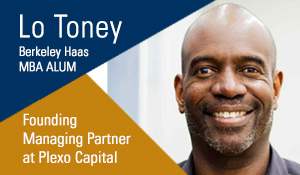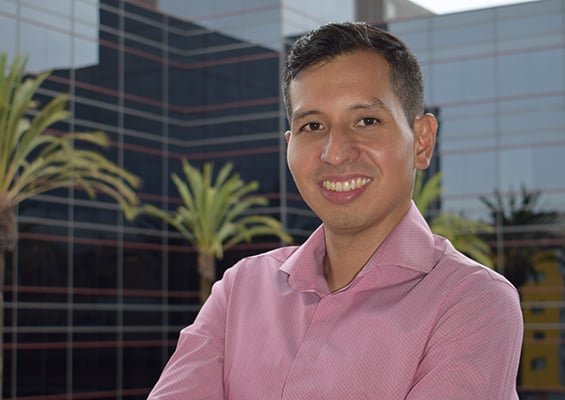 Lo Toney, Haas MBA alum and Founding Managing Partner of Plexo Capital, an institutional investment firm he incubated and spun out from Google Ventures (GV), reached out to the MFE Program in the summer of 2020 when he was looking for an intern. Plexo Capital invests in emerging seed-stage VCs led by diverse teams and invests directly into companies sourced from the portfolios of VCs where Plexo Capital has an investment.
Lo Toney, Haas MBA alum and Founding Managing Partner of Plexo Capital, an institutional investment firm he incubated and spun out from Google Ventures (GV), reached out to the MFE Program in the summer of 2020 when he was looking for an intern. Plexo Capital invests in emerging seed-stage VCs led by diverse teams and invests directly into companies sourced from the portfolios of VCs where Plexo Capital has an investment.
Although initially keen on working at a hedge fund, MFE21 Vishal Tripathi applied for the much-coveted internship position among the MFE students. The rest is history. After completing his internship remotely, Vishal accepted a full-time position as a portfolio manager at Plexo before graduation. He credits Lo with having mentored him throughout the internship while allowing him to work independently.
According to Lo, making decisions with data is something that has always been important to him as an ex-product manager. For instance, he turned Zynga Poker into the largest revenue producing studio during his time at Zynga making data-driven decisions. Although always aware of the power of data firsthand, it was only at GV that Lo learned of the power of data combined with finance to apply to the world of early stage investing. When he was building Plexo Capital inside of GV, Lo realized that he needed both someone that understood sophisticated financial analysis using large sets of data combined with purpose built algorithms and software applications.
"It was clear that we needed a financial engineer, and our analyst did research on the best financial engineering programs, and Haas came out on top. Vishal brings these skills to the table combined with the values alignment that we strive to identify with our candidates."
Asked if he believes that VC firms will hire more and more people with quant skills in the future, Lo is quick to answer that, in his opinion, the future of VC includes more professionals with quantitative skills.
"It is a natural evolution that we are already seeing in the market. Again, I feel that no one does it better than GV at scale to help with deal sourcing, evaluation, and portfolio construction."
Of course, Lo recognizes that currently there is still a need for the human piece of the puzzle especially with regard to the qualitative side. "More and more we see the use of data-driven approaches in the database of the 1,100+ firms we track. Today, most firms are using data tools as another channel to source deals. At the later stage of companies, it has historically been easier to perform quantitative analysis as there is more financial data (i.e., sales + market data) to perform financial projections as well as look at comparable companies."
Moving forward, Lo believes that we will start to see firms leveraging large data sets from early stage companies (pre-seed + seed) to identify signals that can help understand how attractive a prospective investment ranks at the earliest stages of product/market fit. "In fact, we already see firms like Signal Fire that look more like a tech startup in terms of the composition of their teams because they are building out tools and datasets to apply to early stage investing."
In the meantime, the MFE program couldn't be more pleased to see a former Haas MBA student and very successful managing partner of a venture fund grab a Berkeley MFE graduate.







